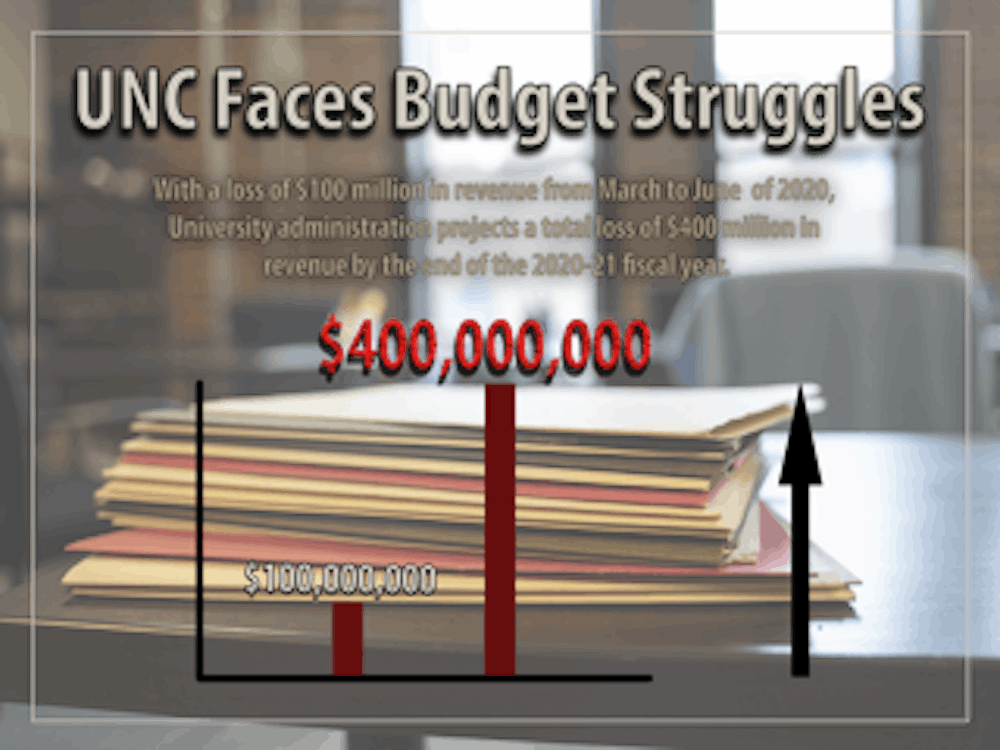Thomas Ross, president of the UNC System from 2011 to 2016, said the System had financial needs before the pandemic even began — and public higher education itself is facing a “historically difficult time."
Potential budget cuts
Becci Menghini, vice chancellor for human resources and equal opportunity and compliance, said at the Faculty Council meeting that the University has begun looking into available tools to solve a budget deficit, including furloughs, base adjustments and early retirements.
So far, she said, furloughs have only taken place within athletics and at the Morehead Planetarium. Broader furloughs would likely only be approved if there are drastic drops in enrollment or state appropriations, Menghini said.
“The good news is that enrollment has stayed steady,” Guskiewicz said at the meeting. “Our credit hours that we're teaching right now are up about 10 percent from where we were last year at this time so that should help in terms of tuition dollars.”
Some departments, though, have already begun making their own cuts. UNC's history department announced that it will not admit graduate students for the 2021 cycle.
Deb Aikat, an associate professor of journalism, said in an email that potential impending UNC System budget cuts have left faculty and staff “severely demoralized.”
Ross said the lack of adequate faculty compensation is an example of a budgetary issue that has been present for years and has been exacerbated by the pandemic.
“Our faculty have lost ground substantially over the last 10 years in terms of compensation compared to other systems,” Ross said. “They’ve had very few — if any — increases and it's a really difficult situation. The system is beginning to have struggles attracting the best and brightest for our faculty.”
Menghini said if the University does make these personnel reductions, it will work to ensure “those with higher earnings assume a larger share of the burden.”
Jenna Robinson is the president of the James G. Martin Center for Academic Renewal, a Raleigh-based non-profit organization that performs research into higher education policy.
She said she thinks the University should put an immediate freeze on hiring but also look at cutting administrative positions.
To get the day's news and headlines in your inbox each morning, sign up for our email newsletters.
“Administrators outnumber faculty more than two-to-one at UNC, and the faculty and the education are the core of what UNC does at its mission,” Robinson said. “So, I think if there are going to be layoffs, I think it should be among the administrative and professional staff.”
No changes to tuition and fees
The UNC Board of Governors previously announced that tuition and fees for schools in the System would not be reduced for this school year, despite any changes in mode of instruction.
Mandatory fees include those from athletics, student activities, debt service, education and technology and campus health, Knuffman said.
Robinson said it is “egregious” that students are having to pay the same fees for things they are not accessing.
“I think the fees are the bigger sticking point than tuition because UNC has always been a really great deal in terms of tuition,” Robinson said.
For four years, the University has not increased in-state undergraduate tuition.
Eric Johnson, who formerly worked for the Office of Scholarship and Student Aid, said while this is good for students and families, it puts pressure on the University since costs increase every year, even if tuition does not.
Ross said previous budget cuts after the 2008 recession have put pressure on the current situation. He said it comes down to a simple equation.
“Budget cuts equal either reduction in programs, reduction in quality or higher tuition,” he said.
Ross said the way policymakers treat the University moving forward will determine if this is a short situation, but regardless, he thinks some consequences will be long term.
“This is not going to be something we get through quickly or easily," Moeser said. "The problems are systematic and fundamental."
The role of politics
Both Moeser and Ross said the intervention of one-party-dominated politics on the BOG has been a concern during this situation.
The 24 voting members are elected by the state legislature, which has been under Republican control since 2010.
Moeser said the UNC System was a “model of governance,” on par with the University of California System, but with the “sacking” of Ross and departure of Margaret Spellings, political intervention left its mark.
Ross said when he was president, he thought politics got left at the door and there was a focus on how to make the UNC System better. He said there was a mix of members from both sides of the aisle.
“As the Board has transitioned, as it clearly has, to one that is much more dominated by one party, politics have tended to creep into decision making on occasions,” Ross said. “I think that does not serve the University well.”
But Moeser said “good leadership” over UNC, especially within the Board of Trustees, has lessened his worries about long-term impact.
“By and large, they have made sound decisions for this campus,” Moeser said. “This University will survive whatever crisis this is.”
@forepreston
university@dailytarheel.com




